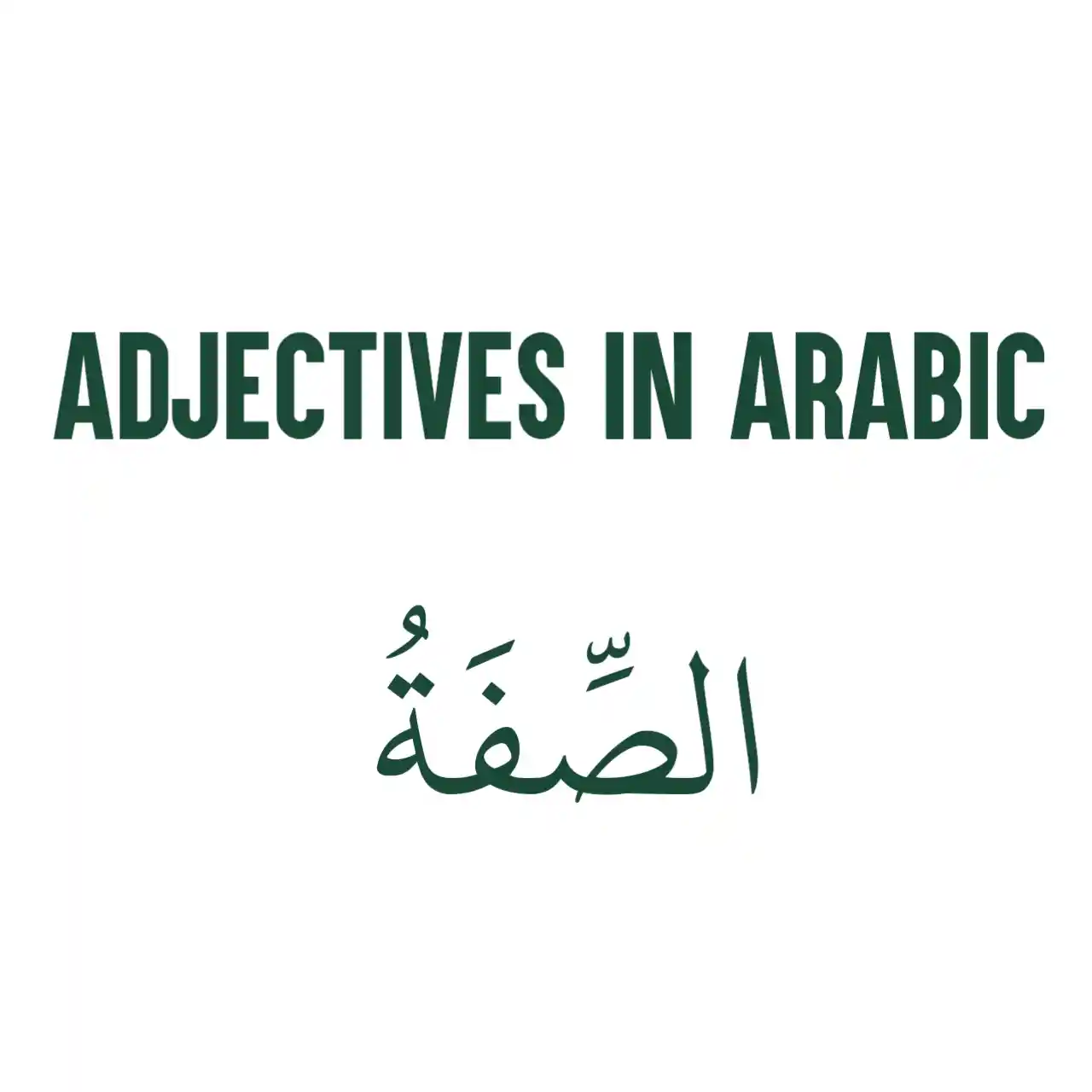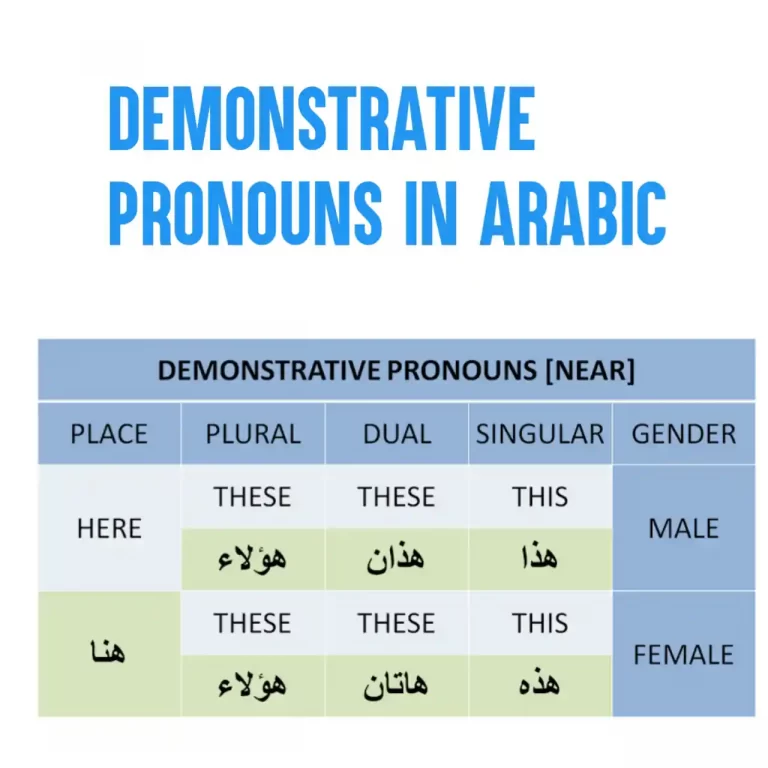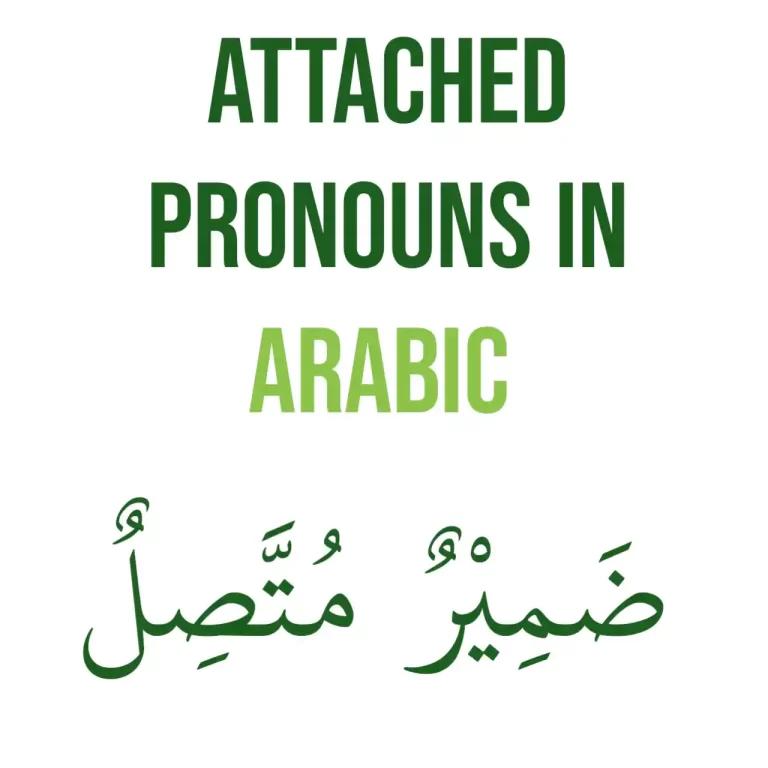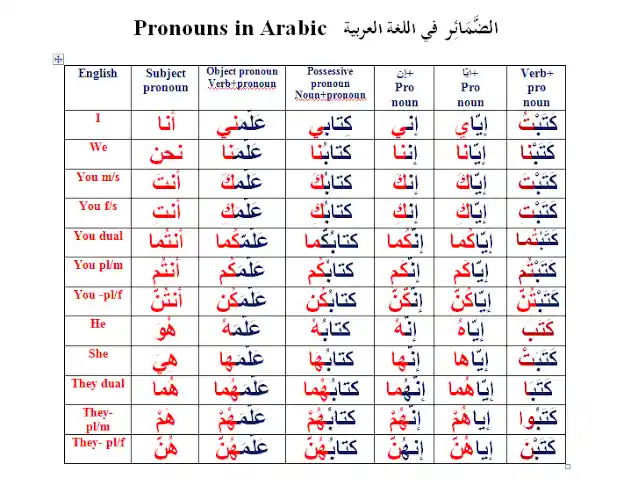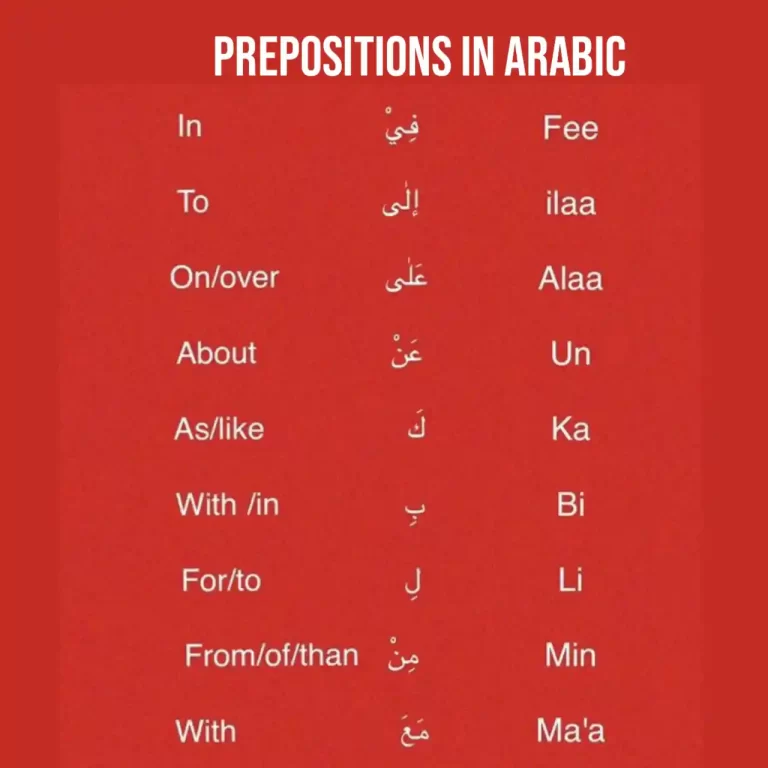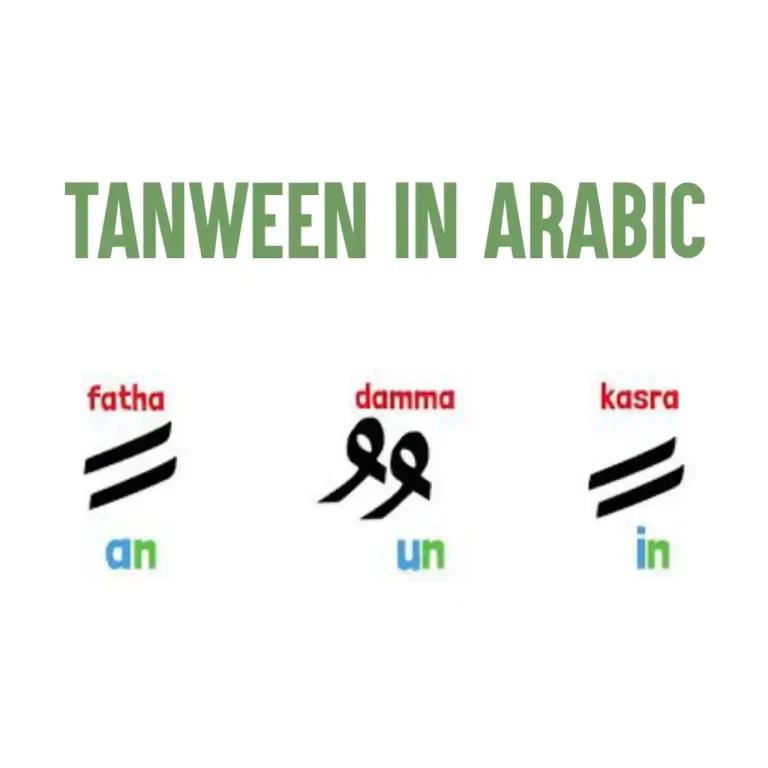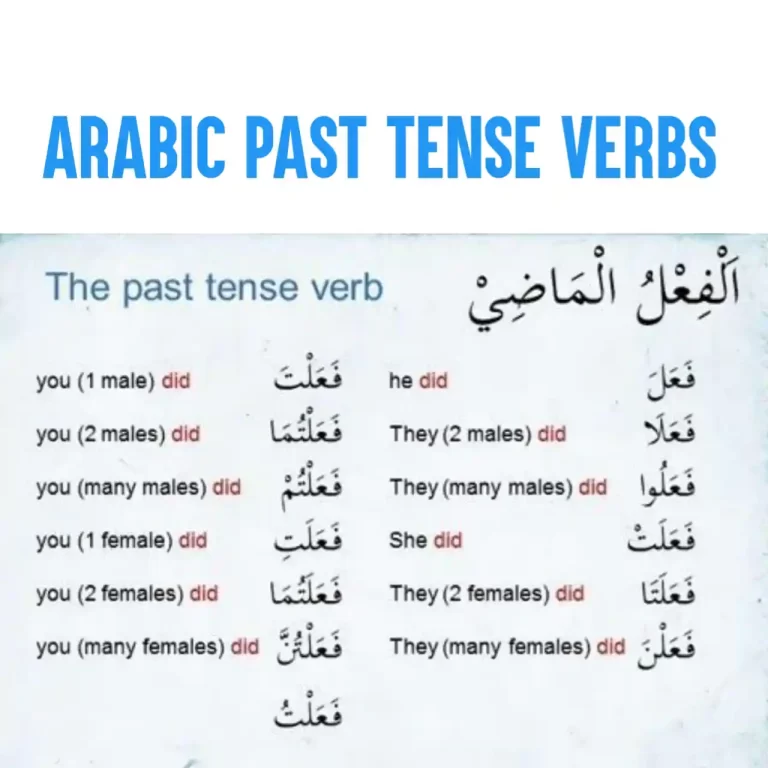Adjectives In Arabic: 200+ List Of Common Arabic Adjectives
Advertisements
Adjectives are an integral part of any language, and Arabic is no exception. These descriptive words add color and detail to our sentences, helping us to better convey our thoughts and ideas.
In this lesson, we will explore the various aspects of adjectives in Arabic, including their forms, uses, and variations.
What Is Adjectives In Arabic?
In Arabic the adjective (a word describing the noun) is either called “Na’t” نَعْتٌ or “As-siffah” الصِّفَةُ, and the noun it qualifies is called “Man’ut مَنْعُوتٌ or “Al-mawsuff” الْمَوْصُوفُ and the clause thus formed is called either النَّعْتُ والْمَنْعُوتُ or الْمُرَكَّبُ الوَصْفِيُّ .
In Arabic, adjectives are placed after the noun they describe, and they must match the gender and number of the noun.
In the English language, when we want to describe a noun we say for example a good boy, the adjective (description) comes before the noun.
Advertisements
However in Arabic the word being used for the description (adjective) comes after the noun, for example, وَلَدٌ جَيِّدٌ or طَالِبٌ كَسْلانُ if translated linguistically means “Boy good” or “student lazy” but literally it means “Good boy” or “Lazy student“.
- A dirty handkerchief مِنْدِيلٌ وَسِخٌ
- An intelligent student طَالِبَةٌ ذَكِيَّةٌ
The adjectives that express feelings normally end with (-an) and bear no Tanween on their ending letters e.g:
- Thirsty عَطْشَانُ
- Hungry جَوْعَانُ
- Full مَلآنُ
- Angry غَضْبَانُ
- Happy فَرْحَانُ
One of the unique features of Arabic adjectives is their system of agreement. In Arabic, adjectives must agree with the noun they modify in gender and number.
For example, if the noun is masculine and singular, the adjective must also be masculine and singular. If the noun is feminine and plural, the adjective must be feminine and plural.
This agreement is important for ensuring that the adjective and noun match in gender and number, and it helps to make the sentence clear and grammatically correct.
Advertisements
READ ALSO Arabic Personal Pronouns With Examples (Essential Guide)
Rules Of Adjective In Arabic
Following are the rules pertained for the formation of the adjective clause:
- Definiteness agreement
- Number Agreement
- Gender Agreement
- Case Agreement
Definiteness agreement
When an adjective is added to describe a noun or a noun phrase, it must agree with it in definiteness. That is, the indefinite noun is followed by an indefinite adjective, and the definite noun is follow by a definite adjective
Both the adjective and the noun must be either definite or indefinite.
Therefore if the noun is definite, then the adjective which is describing the noun will also be definite e.g. الْمَكْتَبُ الْقَدِيمُ meaning “The old table” and when the noun is indefinite the adjective will also be indefinite e.g. كِتَابٌ جَدِيدٌ meaning “A new book“. More examples:
- The big city الْمَدِينَةُ الْكَبِيرَةُ
- A poor man رَجُلٌ فَقِيرٌ
Note that if the adjective after the nouns or the noun phrases is نَكِرَة (indefinite), it is no longer an adjective. Instead, it is a noun functioning as خَبَر forming a nominal sentence. For example الكِتَاب جَدِيْد means the book is new not the new book.
Gender Agreement
The adjective always follows the noun which it is describing in gender. The adjective of a masculine noun is masculine and that of a feminine noun is feminine. For example we say:
- A young boy وَلَدٌ صَغِيرٌ
- A young girl بِنْتٌ صَغِيرَةٌ
- A famous engineer مُهَنْدِسٌ شَهِيرٌ
- A tasty apple تُفَّاحَةٌ لَذِيذَةٌ
Examples of female and male adjectives are:
| English | Transliteration | Arabic |
|---|---|---|
| Beautiful in Arabic | m: jameel f: jameela | جميل جميلة |
| Good in Arabic | m: jayeed f: jayeda | جيد جيدة |
| Happy in Arabic | m: sa’eed f: sa’eeda | سعيد سعيدة |
| Sad in Arabic | m: hazeen f: hazeena | حزين حزينة |
| Tired in Arabic | m: mot’ab f: mot’ba | متعب متعبة |
| Delicious in Arabic | m: latheeth f: lathetha | لذيذ لذيذة |
| Bad in Arabic | m: saye’ f: saye’a | سيئ سيئة |
| Nice in Arabic | m: lateef f: lateefa | لطيف لطيفة |
| Cold in Arabic | m: barid f: bareda | بارد باردة |
| Spicy in Arabic | m: harr f: harrah | حار حارة |
| Hot in Arabic | m: sakhen f: sakhena | ساخن ساخنة |
| Light in Arabic | m: mode’ f: mode’a | مضيئ مضيئة |
| Dark in Arabic | m: mothlem f: mothlema | مظلم مظلمة |
| Easy in Arabic | m: sahl f: sahla | سهل سهلة |
| Black | m: aswad f: sawdaa’ | أَسْودُ سَوْداءُ |
| Red | m: ahmar f: hamraa | أحْمَرُ حمراء |
| Blue | m: azraq f: zarqaa | أزْرَقُ زَرْقَاءُ |
| Green | m: akhddar f: khadraa | اخضر خضراء |
| Blind | m: a3maa f: 3amyaa | أَعْرَجُ عَمْيَاءُ |
| White | m: abyad f: baydaa | ابيض بيضاء |
| Yellow | m: asfar f: safraa | اصفر صفراء |
| Deef | m: attrasj f: ttarsjaa | أَطْرَشُ طَرْشَاءُ |
| Dumb | m: agras f: garsaa | أخْرَسُ خَرْسَاءُ |
| Lame | m: aradj f: ardjaa | أَعْرَجُ عَرْجَاءُ |
Number Agreement
When an adjective is added to a noun, it must agree with it in number. That is, if the noun is singular, the adjective must be singular; if it is dual, the adjective must be dual; and if it plural, the adjective must be plural.
Arabic Dual Adjectives
Another interesting feature of Arabic adjectives is the use of the dual form, which is used to describe nouns that come in dual. ان is added to nouns to make dual for masculine and feminine.
Consider the following examples:
- Two observant Muslims مُسْلِمَان مُلْتَزِمَان
- Two excellent engineers مُهْنْدِسَان مُمْتَازَان
- Two new books كِتَابَان جَدِيْدَان
- Two beautiful girls بِنْتَان جَمِيْلَتَان
Arabic Plural Adjectives
Some examples of Arabic plural adjectives are:
| Adjective Singular | Adjective plural | Meaning |
| Stingy in Arabic | بَخِيْلٌ | بُخَلاَءُ |
| Ignorant in Arabic | جَاهِلٌ | جُهَلاَءُ |
| Beautiful, handsome, good looking | جَمِيْلٌ | جُمَلَاءُ |
| Present in Arabic | حَاضِرٌ | حَاضِرُوْنَ |
| Sad in Arabic | حَزِيْنٌ | حُزَنَاءُ |
| Honest in Arabic | أَمِيْنٌ | أُمَنَاءُ |
| Happy in Arabic | سَعِيْدٌ | سُعَدَاءُ |
| Clever in Arabic | ذَكِيٌّ | أَذْكِيَاءُ |
| Miserable, naughty | شَقِيٌّ | أَشْقِيَاءُ |
| Fat in Arabic | سَمِيْنٌ | سِمَانٌ |
| Truthful in Arabic | صَادِقٌ | صَادِقُونَ |
| Pious in Arabic | صَالِحٌ | صَالِحُونَ |
| Evil, bad | طَالِحٌ | طَالِحُوْنَ |
| Small in Arabic | صَغِيْرٌ | صِغَارٌ |
| Poor in Arabic | فَقِيْرٌ | فُقَرَاءُ |
| Rich in Arabic | غَنِيٌّ | أَغْنِيَاءُ |
| Happy in Arabic | فَرِحٌ | فَرِحُونَ |
| Bad in Arabic | قِبَاحٌ | قِبَاحٌ |
| Tall in Arabic | طَوِيْلٌ | طِوَالٌ |
| Short in Arabic | قَصِيْرٌ | قِصَارٌ |
| Liar; untruthful | كَاذِبٌ | كَاذِبُوْنَ |
| Skillful in Arabic | مَاهِرٌ | مَهَرَةٌ |
| Lazy in Arabic | كَسْلاَنُ | كَسَالَى |
| Enthusiastic; active | نَشِيْطٌ | نَشِيْطُونَ |
| Thin in Arabic | نَحِيْفٌ | نِحَافٌ |
| Blunt in Arabic | كَلِيْلٌ | كِلاَلٌ |
| Sharp in Arabic | حَادٌّ | حِدَادٌ |
| Big in Arabic | كَبِيْرٌ | كِبَارٌ |
| Diligent in Arabic | مُجْتَهِدٌ | مُجْتَهِدُوْنَ |
| Weak in Arabic | ضَعِيْفٌ | ضُعَفَاءُ |
| Clean in Arabic | نَظِيفٌ | نَظِيْفُوْنَ |
| Stupid in Arabic | غَبِيّ | أَغْبِيَاءُ |
| Strong in Arabic | قَوِيٌّ | أقْوِيَاءُ |
| Delicious in Arabic | لَذِيْذٌ | لُذٌّ ; لِذَاذٌ |
| Tasteless in Arabic | تَفِهٌ | تَافِهُوْنَ |
| Bitter in Arabic | مُرٌّ | أَمْرَارٌ |
| Sweet in Arabic | حُلْوٌ | حُلْوُونَ |
| Good in Arabic | جَيِّدٌ | جِيَدٌ |
| Old in Arabic | قَدِيْمٌ | قُدَمَاءُ |
| New in Arabic | جَدِيْدٌ | جُدُدٌ |
| Far in Arabic | بَعِيْدٌ | بَعِيْدُونَ |
| Near in Arabic | قَرِيبٌ | قَرَائِبُ |
| Lame in Arabic | عُرْجٌ | أَعْرَجُ |
Case Agreement
In addition to matching the gender and number of the noun, Arabic adjectives must also agree with the noun in case.
This means that the ending of the adjective must change depending on the role of the noun in the sentence.
In Arabic, adjectives can have up to three different forms, depending on their use in the sentence.
- The first form, known as the nominative, is used when the adjective is the subject of the sentence.
- The second form, known as the accusative, is used when the adjective is the direct object of the sentence.
- The third form, known as the genitive, is used when the adjective is the object of a preposition.
The adjective has the same case as the noun i.e., if the noun is in the nominative case, the adjective will also be in the nominative case e.g., الدَّرْسُ الصَّعْبُ meaning “The difficult lesson“,
If the noun is in the accusative case then the adjective will also be in the accusative case and if the noun is in the genitive case then the adjective will also be in the genitive case e.g. ذَهَبَ أَحْمَدُ إلى صَدِيقٍ مَرِيضٍ Ahmad went to an ill friend.
Nominative Examples
- This is a new teacher هَـٰذَا مُدَرِّسٌ جَدِيدٌ
- The old book is at home الْكِتَابُ القَدِيمُ فِي الْبَيْتِ
- America is a big country أَمْرِيكَا بَلَدٌ كَبِيرٌ
- This is the new fan هَـٰذِهِ الْمِرْوَحَةُ الْجَدِيدَةُ
- A seagull is a beautiful bird النَّوْرَسُ طَيْرٌ جَمِيلٌ
- This is a crowded road هَذَا طَرِيقٌ مُزْدَحِمٌ
- The clean room الْغُرْفَةُ النَّظِيفَةُ
Genitive examples
- The pen is in the small bag الْقَلَمُ فِي الْحَقِيبَةِ الصَّغِيرَةِ
- The water is in a broken glass الْمَاءُ فِي كَأْسٍ مَكْسُورٍ
- Ahmad entered into a vast building دَخَلَ أَحْمَدُ فِي مَنْزِلٍ كَبِيرٍ
Case is called عَلاَمَة الإِعْرَاب ‘word final diacritical mark / parsing mark’ in Arabic. There are three basic parsing marks فَتْحَة, ضَمَّة, and كَسْرَة.
- When the noun or the adjective is assigned ضَمَّة, it is called مَرْفُوْع ‘nominative’.
- If assigned فَتْحَة, it is called مَنْصُوب ‘accusative’.
- If assigned كَسْرَة, it is called مَجْرُور ‘genitive.’
The secondary parsing marks are ان, وَن, يْنِ, and يْنَ. The ان is for masculine and feminine dual, and the وَن is for sound masculine plural. Both mark the nominative case.
The يْنِ with kasrah below the nuun is for dual, and the يْنَ with fatHah over the nuun is for the sound masculine plural. They mark the accusative and genitive cases.
Case assignment is determined by the position of the word in the sentence or by certain particles that precede the noun.
One common mistake made by learners of Arabic is not properly conjugating the adjective to match the gender and number of the noun.
List Of Arabic Adjectives To Describe A Person
Below you will find a list of many Arabic adjectives useful while describing someone’s personality.
| English | Adjectives in Arabic | Transliteration |
|---|---|---|
| Adventurous in Arabic | مُغامِر | mughaamir |
| Affectionate, loving | حَنون | Hanuun |
| Ambitious in Arabic | طَمُوح | TamuuH |
| Arrogant in Arabic | مُتَكَبِّر | mutakabbir |
| Assertive in Arabic | حازِم | Haazim |
| Bold in Arabic | جَرِيء | jarii’i |
| Boring/ dull | مُمِلّ | mumill |
| Brave in Arabic | شُجَاع | shujaa3 |
| Calm in Arabic | هادِئ | haadi’ |
| Careless in Arabic | مُهْمِل | muhmil |
| Cautious/ careful | حَذِر | Hadhir |
| Charismatic in Arabic | كاريزْميّ | kaarizmiy |
| Charming in Arabic | جَذّاب | jadhdhaab |
| Cheerful in Arabic | مَبْسُوط | mabsuuT |
| Classy/ sophisticated | أنيق | aniiq |
| Clever in Arabic | شَاطِر | shaaTir |
| Compassionate/ sympathetic | عَطُوف | 3aTuuf |
| Confident in Arabic | وَاثِق | waathiq |
| Conservative in Arabic | مُحَافِظ | muHaafiDH |
| Creative in Arabic | مُبْدِع | mubdi3 |
| Curious in Arabic | فُضُولِيّ | fuDuuliy |
| Cute in Arabic | جَذّاب | jadhdhaab |
| Diplomatic in Arabic | دِبْلومَاسِيّ | dibluumaasiy |
| Disciplined in Arabic | مُنْضَبِط | munDabiT |
| Emotional/ sensitive | حَسّاس | Hassaas |
| Energetic in Arabic | نَشيط | nashiiT |
| Friendly in Arabic | وَدود | waduud |
| Funny in Arabic | مُضْحِك | muDHik |
| Generous in Arabic | كَريم | kariim |
| Greedy in Arabic | بَخِيل | bakhiil |
| Grumpy/ moody | نَكَدِيّ | nakadiy |
| Hardworking in Arabic | مُجْتَهِد | mujtahid |
| Hasty in Arabic | مُتَسَرَّع | mutasarra3 |
| Helpful in Arabic | مُفيد | mufiid |
| Honest in Arabic | صَريح | SariiH |
| Jealous/ envious | حَسود | Hasuud |
| Kind/ nice | لَطيف | LaTiif |
| Lazy in Arabic | كَسول | kasuul |
| Loyal/ faithful | مُخْلِص | mukhliS |
| Mean/ wicked | لَئِيم | la’iim |
| Modest/ humble | مُتَوَاضِع | mutawaadi3 |
| Naive in Arabic | سَاذِج | saadhij |
| Negative in Arabic | سَلْبيّ | salbiy |
| Optimistic in Arabic | مُتَفائل | mutafaa’il |
| Organized in Arabic | مُنَظَّم | munaDHDHam |
| Patient in Arabic | صَبور | Sabuur |
| Pessimistic in Arabic | مُتَشائِم | mutashaa’im |
| Polite in Arabic | مُؤَدََب | mu’addab |
| Positive in Arabic | إِيْجَابِيّ | iijaabiy |
| Punctual in Arabic | مُنْضَبِط | munDHabit |
| Rational, reasonable | عَقْلانِيّ | 3aqlaaniy |
| Reserved in Arabic | مُتَحَفِّظ | mutaHaffiDH |
| Respectful in Arabic | مُحْتَرَم | muHtaram |
| Responsible in Arabic | مَسْؤول | mas’uul |
| Romantic in Arabic | رومانسيّ | ruumaansiy |
| Rude in Arabic | وَقِح | waqiH |
| Selfish in Arabic | أنانيّ | anaaniy |
| Sloppy in Arabic | قَذِر | qadhir |
| Sociable in Arabic | اِجْتِماعيّ | ijtimaa3iy |
| Stubborn in Arabic | عَنيد | 3aniid |
| Straightforward in Arabic | صَريح | SariiH |
| Strong in Arabic | قَوِيّ | qawiy |
| Tolerant in Arabic | مُتَسامِح | mutasaamiH |
| Trustworthy in Arabic | مَوْثوق | mawthuuq |
| Unique in Arabic | فَريد | fariid |
| Weak in Arabic | ضَعيف | Da3iif |
List Of Adjectives In Arabic And English
Here is a list of many Arabic adjectives useful in Arabic and English.
pronunciation written next to it.
| English | Arabic |
|---|---|
| Beautiful | جَميل |
| Ugly | قَبيح |
| Old | قَديم |
| New | جَديد |
| Hot | ساخِن |
| Cold | بارِد |
| Big | كَبير |
| Small | صَغير |
| Cheap | رَخيص |
| Expensive | غالي |
| Good | جَيِّد |
| Bad | سَيِّء |
| Long | طَويل |
| Short | قَصير |
| Early | مُبَكِّر |
| Late | مُتَأَخِّر |
| Many/ much | كَثير |
| Little | قَليل |
| Important | مُهِمّ |
| Different | مُخْتَلِف |
| Busy | مَشْغول |
| Clean | نَظيف |
| Dirty | وَسِخ |
| Hard/ difficult | صَعْب |
| Easy | سَهْل |
| Old | كَبير |
| Young | صَغير |
| Weird | غَريب |
| Strong | قَوِيّ |
| Weak | ضَعيف |
| Tall | طَويل |
| Short | قَصير |
| Fat | سَمين |
| Thin | نَحيف |
| Poor | فَقير |
| Rich | غَنِيّ |
| Heavy | ثَقيل |
| Light | خَفيف |
| Fast | سَريع |
| Slow | بَطيء |
| Lazy | كَسول |
| Sad | حَزين |
| Happy | مَسْرور |
| Boring | مُمِلّ |
| Smart | ذَكِيّ |
| Stupid | غَبِيّ |
| Blue | أَزرَق |
| Gray | رَمادي |
| White | أبيض |
| Green | أَخضَر |
| Black | أسود |
| Raw | نَيِئ |
| Orange | بُرتُقالي |
| Red | أَحمَر |
| Yellow | أَصفَر |
| Brown | بُنّي |
| sweet | حُلو |
| fried in Arabic | مَقلي |
| bitter | مر |
| sour in Arabic | حامِض |
| spicy in Arabic | حار |
| cooked in Arabic | |
| salty in Arabic | مالِح |
| fresh in Arabic | طازَج |
| frightened in Arabic | خائِف |
| angry | غاضِب |
| shy in Arabic | خَجول |
| nervous in Arabic | قَلِق |
| wicked; malicious | شرير |
| confused in Arabic | حائِر |
| regretful in Arabic | نادِم |
| annoyed; upset | مُنزَعِج |
| content; satisfied | راضي |
| proud in Arabic | |
| bald in Arabic | أَصلَع |
| bearded in Arabic | مُلتَحي |
| old; elderly | عَجوز |
| young in Arabic | شاب |
| heavy in Arabic | ثَقيل |
| vast; wide | شاسِع |
| terrible in Arabic | رَهيب |
| huge in Arabic | ضَخم |
| great in Arabic | عَظيم |
| rainy in Arabic | مُمطِر |
| windy in Arabic | عاصِف |
| cloudy in Arabic | غائِم |
| sunny in Arabic | مُشمِس |
| cold in Arabic | بارِد |
| shiny in Arabic | لامِع |
| cracked in Arabic | مُتَشَقِّق |
| smooth in Arabic | أَملَس |
| rough in Arabic | خَشِن |
| humid in Arabic | رَطِب |
| fragile in Arabic | هَش |
| sticky in Arabic | لَزِج |
| wet in Arabic | |
| slippery in Arabic | زَلِق |
| dry in Arabic | جاف |
| public in Arabic | عام |
| private; special | خاص |
| difficult in Arabic | صَعب |
| important in Arabic | هام |
| soft in Arabic | ناعِم |
| boring in Arabic | مُمِل |
| true; correct | صَحيح |
| wrong in Arabic | خاطِئ |
| simple in Arabic | بَسيط |
| clear; obvious | وَاضِح |
| complex in Arabic | مُعَقَّد |
In order for the adjective to be feminine, we must add ta marbuta [ة] at the end of it. For example: جَميل [jamiil] (beautiful masculine) – جَميلة [jamiila] (beautiful feminine).
Conclusion
In conclusion, Arabic adjectives are an essential part of the language and add richness to the sentences. With practice and exposure to the language, it is possible to become proficient in using adjectives in Arabic.
Advertisements

